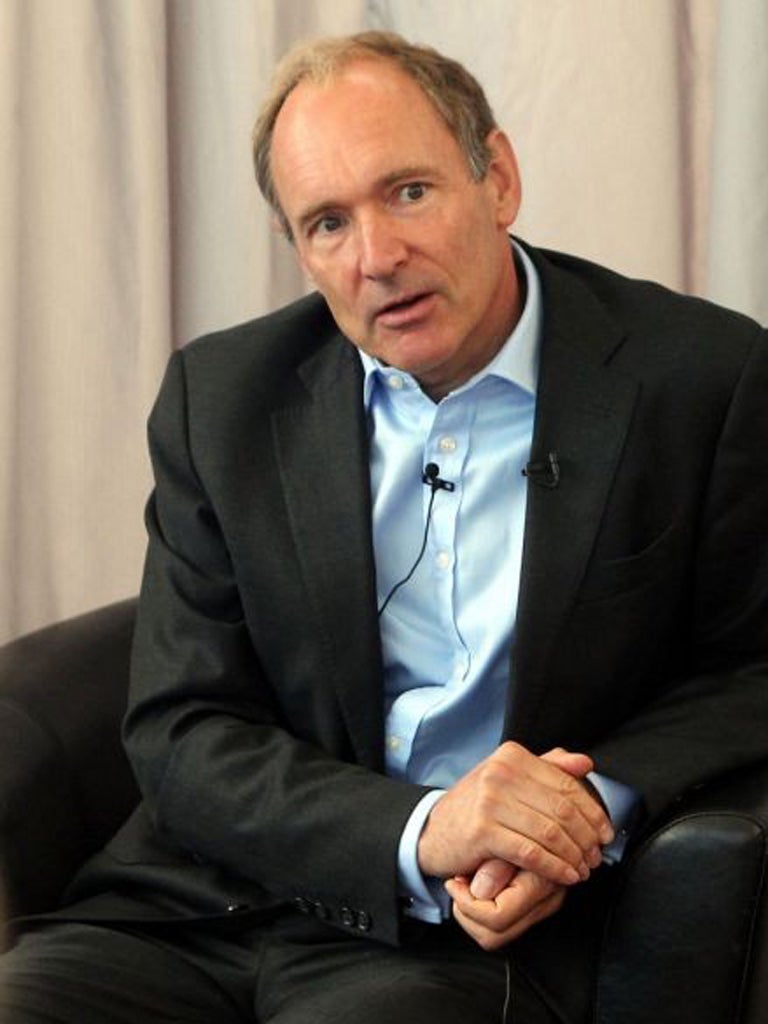Web inventor Tim Berners-Lee denies internet 'off-switch'

Your support helps us to tell the story
From reproductive rights to climate change to Big Tech, The Independent is on the ground when the story is developing. Whether it's investigating the financials of Elon Musk's pro-Trump PAC or producing our latest documentary, 'The A Word', which shines a light on the American women fighting for reproductive rights, we know how important it is to parse out the facts from the messaging.
At such a critical moment in US history, we need reporters on the ground. Your donation allows us to keep sending journalists to speak to both sides of the story.
The Independent is trusted by Americans across the entire political spectrum. And unlike many other quality news outlets, we choose not to lock Americans out of our reporting and analysis with paywalls. We believe quality journalism should be available to everyone, paid for by those who can afford it.
Your support makes all the difference.The inventor of the world wide web has denied there is an “off-switch” which could turn off the internet across the globe.
Sir Tim Berners-Lee, who launched the web on Christmas Day 1990, said the only way the internet could only ever be entirely shut down is if governments all over the world co-ordinated to make it a centralised system.
It comes after moves by the Egyptian government last year to suppress use of the web led to speculation that the Hosni Mubarak regime had found a kill switch for the internet.
Speaking at the launch of the first ever global league table classifying countries which put the web to work best, the 57-year-old computer scientist said: "The way the internet is designed is very much as a decentralised system.
"At the moment, because countries connect to each other in lots of different ways, there is no one off switch, there is no central place where you can turn it off.
"In order to be able to turn the whole thing off or really block, suppress one particular idea then the countries and governments would have to get together and agree and co-ordinate and turn it from a decentralised system to being a centralised system.
"And if that does happen it is really important that everybody fights against that sort of direction."
Sweden has topped the Web Index league table launched by the World Wide Web Foundation, followed by the US in second and the UK in third.
Burkina Faso, Zimbabwe and Yemen were the bottom three of 61 countries measured using indicators such as the political, economic and social impact of the web, connectivity and use.
Asked about rumours that he himself was one a handful of people who had the ability to switch off the net, Sir Tim joked: "I am afraid that now that you know I will have to shoot you.
"I have put on filters which allow me just to investigate just every single word that any of you have said to each other.
"You won't know what is happening but as you talk to each other it will be quietly modified to appear to be whatever I want you to be saying.
"I will take a deep control of the world.
"Apart from that, everything will remain as usual."
Comedian and avid Twitter user Stephen Fry, 55, was also present at the launch of the Web Index at the National Theatre in central London.
Fry was supposed to be introducing the panellists speaking at the event, but arrived late and blamed it on a visit to a nightclub the night before.
Speaking afterwards, he said the greatest threat to freedom on the internet was the attempt to curb the free exchange of ideas.
He said: "The free exchange of ideas is what is behind democracy or any kind of open way of living and when you control the press, when you control television, radio or now what you might call the web, all the transactions of knowledge that flow between people, individuals and countries, when firewalls are put around that, when information is not allowed in or out of a country, it is pretty much inexcusable."
PA
Join our commenting forum
Join thought-provoking conversations, follow other Independent readers and see their replies
Comments